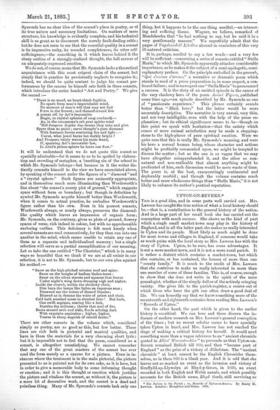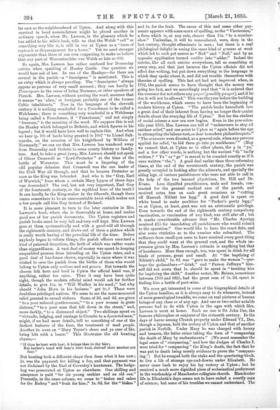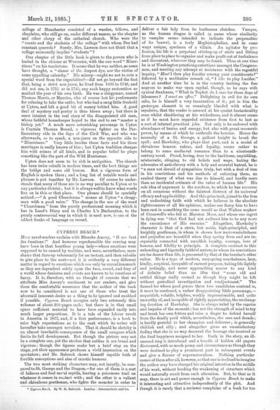UPTONON-SEVE RN.*
THIS is a good idea, and in some parts well carried out. Mrs. Lawson has caught the true notion of what a local history should be,—that is, a contribution to the general history of the nation. And in a large part of her small book she has carried out the conception with much success. She shows us the kind of part which a single small market-town may play in the history of England, and in all the latter part she makes us really interested in Upton and its people. Most likely as much might be done for most towns and villages in England, if someone would take as much pains with the local story as Mrs. Lawson has with the story of Upton. Upton, to be sure, has some advantages. It is not a mere market-town, and it is not a mere rural parish. It is rather a district which contains a market-town, but which also contains, or has contained, the houses of more than one "county family." It is much to the credit of Mrs. Lawson that she contrives to make us really interested in more than one member of some of these families. This is, of course, enough to show that she does not write in the spirit of the mere genealogist, whether of the simply dull or of the actively cringing variety. She gives life to the parish-register, a source out of which those who have the gift can often draw a good deal of life. We can honestly say that we know something more of the seventeenth and eighteenth centuries from reading Mrs. Lawson's "Records of Upton."
On the other hand, the part which is given to the earlier history is uncritical. We can here and there discern the influence of modern research on Mrs. Lawson's general conception of the times ; but no recent scholar seems to have specially taken Upton in hand, and Mrs. Lawson has not reached the stage of making a critical history for herself. It would need something more than a vague reference to an "ancient chronicle quoted in Allies' Worcestershire" to persuade us that Upton-onSevern remained British till 930, and then "became part of England" as the prize of a victory of /Ethelatan. The "ancient chronicle" at least cannot be the English Chronicles themselves, as in them 930 is a blank year. And it is odd that she leaves out so marked an event as the invasion and victory of Gruffydd-ap-Llywelyn at Rhyd-y-Groes, in 1030, an event recorded in both English and Welsh annals, and which possibly accounts for the British name, Rhyd (ford), still surviving so
far east as the neighbourhood of Upton. And along with this survival in local nomenclature might be placed another in ordinary speech, when Mr. Lawson, in the glossary which he has added to his wife's book, tells us that the Welsh " cefl" or something very like it, is still in use at Upton as a "term of reproach or disparagement for a horse." Yet we need stronger arguments than these of our own suggesting to make us believe that any part of Worcestershire was Welsh as late as 930.
So again, Mrs. Lawson has rather confused her Domesday entries when speaking of Hanley Castle. One question we would here ask of her. In one of the Hanleys—for there are several in the parish—a " francigena " is mentioned. This is an entry which is always puzzling. The " francigence " always appear as persons of very small account ; they can hardly be Francigenal in the sense of being Normans, or other speakers of French. Mrs. Lawson, without quoting the word, assumes that it means "an • alien,' or foreigner, probably one of the former Celtic inhabitants." Now in the language of the eleventh century it is nothing wonderful for a Frenchman to be called a Welshman ; there is something very wonderful in a Welshman being called a Frenchman, if "Frenchman," and not simply "freeman," is the meaning of the word. We suppose this is not the Hanley which belonged to Brihtric, and which figures in his legend ; but it would have been well to explain this. And when we hear (p. 10) of lands being granted in 1067 "to Lionel Saltmarshe, on the occasion of his knighthood by William of Normandy," we can see that Mrs. Lawson has wandered away from Domesday and Orderic to some county history or familytree. And, to take a great jump, Mrs. Lawson should not speak of Oliver Cromwell as "Lord-Protector" at the time of the battle of Worcester. This must be a lingering of the odd popular delusion that Cromwell was the one leader of the Civil War all through, and that he became Protector as soon as the King was beheaded. And who is the "Guy, Earl of Warwick," from whom a certain Mary Lygon of those days was descended ? The real, but not very important, Earl Guy of the fourteenth century, or the mythical hero of the tenth ? It can hardly be the King-maker in the fifteenth, though there seems somewhere to be an unaccountable twist which makes not a few people call him Guy instead of Richard.
It is more pleasant to turn to the later centuries in Mrs. Lawson's book, where she is thoroughly at home, and makes good use of her parish documents. The Upton registers and parish books must be very full and very well kept. Mrs. Lawson goes at them systematically and with a good-will all through the eighteenth century, and draws out of them a picture which is really worth having of the parochial life of the time. Before anybody began to reform things, the parish officers exercised a kind of paternal despotism, the fault of which was rather waste than niggardliness. A vast deal of money was spent in keeping unqualified persons from intruding on the Upton rates, and a good deal of harshness shown, especially in cases where it was wished to save the parish from the births of those who would belong to Upton only natione and not genere. But towards the chosen folk born and bred in Upton the official hand was, if anything, rather too open. Thus it may have been quite right, though the modern official mind would ask for further details, to give 15s. to "Will Wadley in his need ;" but why should "John Horn in his laziness " get 9s. ? These were doubtless privileged natives. We seem to see the more measured relief granted to casual visitors. Sums of 3d. and fid. are given "to a poor reduced gentlewoman," "to a poor woman in grate distress," "to a poor man that fell down in the street," and, more darkly, "to a distressed object." Two shillings spent on " victualls, lodging, and carriage to Crombe to a dyeracied man," might, if we had more details, tell us something of one of the darkest features of the time, the treatment of mad people. Another 2s. went on "Mary Toyne's shoes and ye care of her, being hitt with a boare." This illustrates the old hunting rhyme,— " If thou be hurt with hart, it brings thee to thy bier;
But barber's hand will boar's hurt heal, thereof thou needest not fear."
But hunting took a different shape then from what it has now ; 2s. was the payment for killing a fox, and that payment was not disdained by the Earl of Coventry's huntsman. The hedgehog was persecuted at Upton as elsewhere. One shilling and ninepence is paid "for six young urchins and an old one." Presently, in the same column, we come to " biskes and cakes for the Bishop" and "fruit for him ;" is. 6d. for the " biskes "
and le. for the fruit. The cause of this and some other payments appears with some scorn of spelling, as the " Vizetersion," a form which is, at any rate, clearer than 15s. "to a numberelow." Umbrellas, it will be remembered, were, deep in the last century, thought effeminate in men ; but there is a real philological delight in seeing the same kind of process at work which led to such pet names as " Ned " and "Nell," and by an opposite application turned nadder into "adder." Indeed the entries, like all such entries everywhere, tell us something at every step, and that just because the Upton officials did not affect fine writing, but put down everything in the language in which they spoke about it, and did not trouble themselves with theories of spelling. This last art had not improved when, in 1762, the parish seems to have thought that the money was going too fast, and we accordingly read that " it is ordered that the overseer doe not relieve any papor [possibly pauper], and if he doe it will not be allowed." This was the year before the building of the workhouse, which seems to have been the beginning of modern history at Upton. "The parish-books henceforth lose a great deal of their interest from having no longer their quaint details about the everyday life of Upton." But for the student of social science a new era now begins. Even in the prEe-scientific year 1763, Mrs. Lawson can tell of "endeavours to stop all outdoor relief," and can point to -Upton as "again before the age in attempting the labour-test, so dear to modern philanthropists." "The overseers were directed, as a general rule, when any persons applied for relief, to bid them go into ye workhouse.'" (May we remark that, at Upton as in other places, the y in "ye," and a few other words, is nothing but the ancient " th" badly written ? " Ye " or " ge " is meant to be sounded exactly as if it were written "the.") A good deal earlier than these reforming times, at the end of the seventeenth century, the parish was greatly occupied in looking after the ailments, and specially the ailing legs, of various parishioners who were not able to call in the help of the two learned physicians, Dr. Hill and Dr. Evans. Less dignified practitioners, male and female, contracted for the general medical care of the parish, and received extra fees on such great occasions as "cutting off Hannah Niblett her legg." A good deal is spent on white bread to make poultices for "Parker's gouty legg ;" so at Upton, at least, gout was not an aristocratic privilege. Even towards the end of the eighteenth century compulsory vaccination, or vaccination of any kind, was still afar off; but it marks considerable advance that "Mr. Charles Aycrigg received £15 for inoculating all parishioners who would submit to the operation." One would like to have the exact date, and also some statistics as to the number who submitted. The sufferers from small-pox seem to have received every good thing that they could want at the general cost, and the whole impression given by Mrs. Lawson's extracts is anything but that of harshness. More than enough, too, was spent in drink for all kinds of persons, great and small. At "the baptizing of Niblett's child," is. 6d. was "gave to make the women "—perhaps the godmothers—" drink," and "Parson Jeffreys" himself did not scorn that is. should be spent in "treating him for baptizing the child." Another rector, Mr. Baines, somewhere between 1768 and 1825, had the great sum of 5s. 2d. spent in finding him a bottle of port-wine.
We even get interested in some of the biographical details of the Upton families, as it is always easy to do whenever, instea& of mere genealogical twaddle, we come on real pictures of human beings of any class or of any age. And one or two rather notable persons had to do with Upton in the ages with which Mrs. Lawson is most at home. Such an one is Dr. John Dee, the famous philosopher or conjurer of the sixteenth century. In the days of havoc among Church property under Edward VL, Dee, though a layman, held the rectory of Upton and that of another parish in Norfolk. Under Mary he was charged with heresy and treason, the latter crime taking the form of "compassing the death of Mary by enchantments." (We must remember the legal sense of ".compassing," and how the Judges of Charles I. were tried for " compassing " the King's death, the fact that he was put to death being merely evidence to prove the "compassjug.") But he escaped both the stake and the quartering-block, to live a life of strange ups-and-downs under Elizabeth. He never came back to enjoy his lay rectory at Upton ; but he received a much more dignified piece of ecclesiastical preferment in the wardenship of Manchester collegiate church. Manchester life in Elizabeth's days seems not to have suited a courtly man of science; but some of his troubles we cannot understand. The college of Manchester consisted of a warden, fellows, and chaplains, who still go on, under different names, as the chapter and other clergy of the cathedral church. Who were the "curate and the students of the college" with whom Dee had constant quarrels ? Surely, Mrs. Lawson does not think that a college necessarily implies "students "P
One chapter of the little book is given to the person who is buried in the cloister at Worcester, with the one word " Miserrimus " on his tombstone. It seems that he was neither, as some have thought, a "sinner of the deepest dye, nor the victim of some appalling calamity." His misery—ought we not to coin a special word from the superlative ?—did not go beyond the fact that, being a strict non-juror, he lived from 1660 to 1748, and did not see, in 1715 or in 1745, any such happy restoration as marked the year of his own birth. He was a clergyman, named Thomas Morris, or Maurice, who of course lost his preferments for refusing to take the oaths, but who had a snug little freehold at Upton, and left a-good bit of money behind him. A good deal of mystery and poetry is thus blown away ; but there is some interest in the real story of the disappointed old man, whose faithful housekeeper hoped to the end to see "master a bishop yet." A much more astonishing personage in Upton is Captain Thomas Bound, a vigorous fighter on the Parliamentary side in the days of the Civil War, and who was afterwards, so to speak, a non-juror on the opposite side to " Miserrimns." Very little besides these facts and his three marriages is really known of him ; but Upton tradition charges him with crimes of all kinds, and in popular belief he plays something like the part of the Wild Huntsman.
Upton does not seem to be rich in antiquities. The church has been twice rebuilt in modern times, and the best things are the bridge and some old houses. But a vigorous form of English is spoken there ; and a long list of notable words and phrases is put together by Mr. Lawson. Of course he understands that many of these are in no way peculiar to Upton or to any particular district ; but it is always well to know what words live on in this or that place. One phrase should be specially noticed :—" A good Churchman" means at Upton "a clergyman with a good voice." The change in the use of the word " Churchman " from the purely professional meaning which it has in Laud's Diary and in Charles L's Declaration, to the purely controversial way in which it is used now, is one of the oddest freaks of language on record.




































 Previous page
Previous page